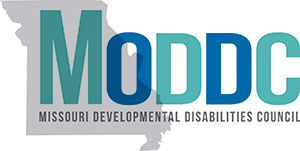Missouri Developmental Disabilities Council's Position Competitive Employment
Everyone who wants to work can work, and should get to work. People with disabilities should get to work, just like everyone else. They just need a chance and the right accommodations.
Accommodations are changes that make things easier for people with disabilities. Accommodations are different for every person to help meet their needs.
Some kinds of accommodations are:
- Having an ASL interpreter
- Timers to help stay on task
- Getting a quiet space to work away from other people
- Having a service dog
- And more!
Jobs need to give good accommodations to people with disabilities. That will help more people with disabilities to:
- Have good jobs.
- Work in their communities.
- Work with people without disabilities.
- Earn at least the minimum wage.
When someone with a disability gets a real job for real pay, it’s called competitive employment. All people with disabilities deserve competitive employment.
Why is this important?
Working can be helpful for people with disabilities. People with disabilities who work are healthier than those who don’t. They have better lives, and need less help from Medicaid and Medicare.
But many people with disabilities have trouble getting and keeping jobs. Only 1 in 3 Missourians with disabilities had jobs in 2018. To compare, more than 4 out of 5 Missourians without disabilities had jobs. Missourians with disabilities were also less likely to have jobs than disabled people in other states.
People with disabilities get paid less than people without disabilities. Workers with disabilities only got paid 66 cents for every dollar made by workers without disabilities. The law also lets some companies pay people with disabilities less than the minimum wage. Almost 6,000 people with disabilities in Missouri work for less than minimum wage.
Many people with disabilities need services like Social Security and Medicaid to survive. These services won’t help people if they make more than a certain amount of money. Many people with disabilities are afraid they will lose their services if they work.
MODDC asked people with disabilities about work. Most people said they had trouble finding work, or weren’t getting what they needed at work. Missouri can do better at making good jobs for people with disabilities.
What should Missouri do?
- Missouri needs to understand that people with disabilities should get to earn a good living. They should get to be a part of their community as a worker. They should get to have a career if they want. They should get the chances and help they need, no matter where they live. And they should get help finding a job as soon as they want to work.
- All people with disabilities deserve the chance to have good jobs. They also deserve to get the help they need to get and keep those jobs. Groups that help people with disabilities need to think of them as good workers.
- A sheltered workshop is a place where mostly disabled people work. They get kept separate from non-disabled workers, and sometimes get paid less than minimum wage. Groups in Missouri should help people get out of sheltered workshops and get better jobs. Groups should also reach out to people with disabilities who live far from cities.
- Many people have support plans like Individualized Education Plans (IEPs) and Person Centered Plans. These plans list out people’s goals. These plans should make getting a good job a goal. They should also say what help a person will need to get a good job.
- As students get ready to finish school, schools should help them:
- Learn about careers
- Get work experience
- Learn to manage their money
- Get in touch with people and groups that can help them
- Missouri’s Vocational Rehabilitation has services called Pre-Employment Transition Services. These services are for students with disabilities who are almost old enough to work. Any students who need them should get these services. These services should help students learn everything they need to do to get a good job. They should help with things like:
- Learning about different kinds of jobs they could do
- Trying out different jobs
- Figuring out what to do after high school
- Getting ready to live on their own
- Learning new social skills
- Learning to advocate for themselves at work
- Groups that help people with disabilities should partner with private businesses. They should work together to help people with disabilities get and keep good jobs. This help can be things like:
- Working together to plan services
- Learning about different jobs they can do.
- Job training
- Getting accommodations
- Transportation
- Finding internships and jobs
- Other states have already made programs to help people with disabilities get good jobs. Missouri state government should learn from these states and make its own programs. Then they should show other groups how they can help people with disabilities.
- Many service programs that help people with disabilities stop helping if someone makes too much money. There are programs that can help people with disabilities avoid losing services. For example, someone can start an ABLE account to save money. Groups that help people with disabilities should tell them about these programs.
To Learn More
Hall, J. P., Kurth, N. K., & Hunt, S. L. (2013). Employment as a health determinant for working-age, dually-eligible people with disabilities. Disability and Health Journal, 6(2), 100-106.
Golden, R. (2020). Why do pay gaps persist for US workers with disabilities? HR Dive. Available at:
https://www.hrdive.com/news/why-do-pay-gaps-persist-for-us-workers-with-
disabilities/581533/#:~:text=A%202019%20report%20by%20the,earned%20by%20those%20without%20disabilities
Morris, Rodriguez, & Blanck. (2016). ABLE accounts: A down payment on freedom. Inclusion 4(1), 21-29.
Missouri Developmental Disabilities Council (2021). Comprehensive Review and Analysis, February 28, 2021 (summarizing statistics and statewide survey)
34 C.F.R. § 361.48
See, https://www.moable.com/; http://www.ablenrc.org

